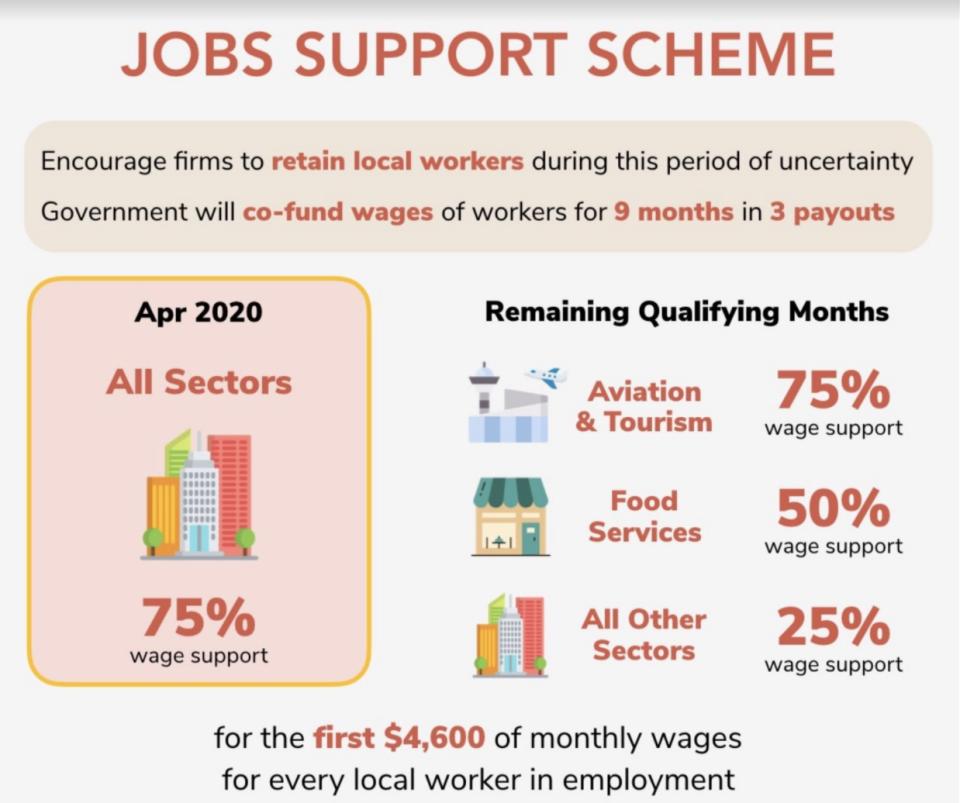COVID-19: Over 140,000 employers to get first $7b tranche of Jobs Support Scheme payouts

SINGAPORE — Over 140,000 employers will start to receive the first tranche of payouts totalling over $7 billion under the Jobs Support Scheme (JSS) to help cover the wages of over 1.9 million local employees in Singapore amid the COVID-19 pandemic.
The first tranche will be paid from Wednesday (15 April) based on wages paid from October- December 2019, the Ministry of Finance and the Inland Revenue Authority of Singapore said in a joint statement.
Under the JSS, the Government will co-fund the first $4,600 of gross monthly wages paid to each local employee for nine months.
Firms in the aviation and tourism sector will receive 75 per cent co-funding; firms in the food services sector will receive 50 per cent co-funding; and firms in all other sectors will receive 25 per cent co-funding. Employers do not need to apply to receive the JSS payouts.
The JSS aims to help employers retain their local employees - Singaporeans and Permanent Residents - during the period of economic uncertainty caused by the pandemic. It was introduced on 18 February as part of the Unity Budget, and subsequently enhanced at the Resilience and Solidarity Budgets. The government’s response to COVID-19 will total $59.9 billion, or about 12 per cent of Singapore’s gross domestic product.
As announced by Deputy Prime Minister and Minister for Finance Mr Heng Swee Keat on 6 April, the JSS wage subsidy for the month of April 2020 will be enhanced to 75 per cent for all sectors to help firms retain and pay their workers during the circuit breaker period, which is from 7 April to 4 May.
This additional subsidy will be paid together with the first tranche, computed first based on October 2019 wages, and subsequently adjusted based on actual wages paid in April 2020 in future JSS tranches. Subsequent tranches will be paid in July and October.
Companies with CorpPass can view the notification letters via myTax Portal from 20 April.
Eligible companies will be notified by post of their tier of support and the amount of JSS payout payable to them. Alternatively, companies may check if they are eligible for JSS via the IRAS website.
Employers that have earlier signed up for PayNow Corporate or have existing GIRO arrangements with IRAS will have payouts directly credited to their registered bank accounts on Thursday. Companies currently not on GIRO or PayNow Corporate will start receiving their cheques from 23 April onwards.
More information on the JSS is available on IRAS’ website (www.iras.gov.sg), or contact IRAS at 1800-352-4728.
Stay in the know on-the-go: Join Yahoo Singapore's Telegram channel at http://t.me/YahooSingapore
Related stories:
COVID-19 Budget: Singapore allocating additional $48 billion to combat ‘unprecedented crisis’
Budget 2020: $5.6b packages to help alleviate economic slowdown

 Yahoo Finance
Yahoo Finance 
